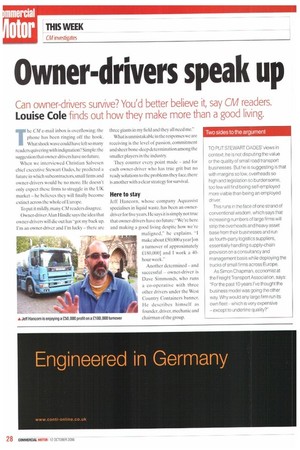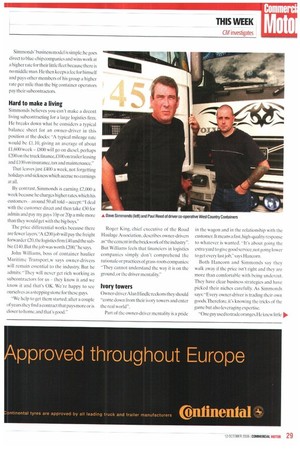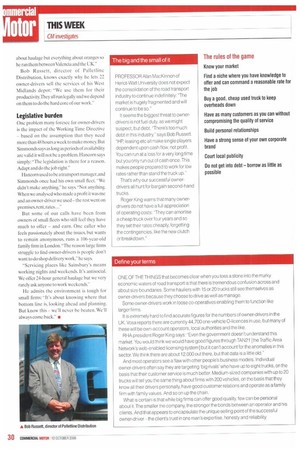Owner-drivers speak up
Page 28

Page 29

Page 30

If you've noticed an error in this article please click here to report it so we can fix it.
Can owner-drivers survive? You'd better believe it, say CM readers.
Louise Cole finds out how they make more than a good living.
The CM e-mail inbox is overflowing: the phone has been ringing off the hook. What shock wave could have left so many readers quivering with indignation? Simple:the suggestion that owner-drivers have no future.
When we interviewed Christian Salvesen chief executive Stewart Oades, he predicted a future in which subcontractors, small firms and owner-drivers would be no more. He doesn't only expect these firms to struggle in the UK market he believes they will finally become extinct across the whole of Europe.
To put it mildly, many CM readers disagree.
Owner-driver Alan Hindle says the idea that owner-drivers will die out has "got my back up. I'm an owner-driver and I'm lucky there are three giants in my field and they all need me."
What is unmistakable in the responses we are receiving is the level of passion, commitment and sheer bone-deep determination among the smaller players in the industry.
They counter every point made and for each owner-driver who has true grit but no ready solutions to the problems they face, there is another with a clear strategy for survival.
Here to stay
Jeff Hancorn, whose company Aquassist specialises in liquid waste, has been an ownerdriver for five years. He says it is simply not true that owner-drivers have no future:"We're here and making a good living despite how we're maligned," he explains. "1 make about .£50,000 a year [on a turnover of approximately £180,000] and I work a 40hour week."
Another determined and successful owner-driver is Dave Simmonds, who runs a co-operative with three other drivers under the West Country Containers banner. I le describes himself as founder, driver, mechanic and chairman of the group. Simmonds' business model is simple: he goes direct to blue-chip companies and wins work at a higher rate for their little fleet because there is no middle man. He then keeps a fee for himself and pays other members of his group a higher rate per mile than the big container operators pay their subcontractors.
Hard to make a living
Simmonds believes you can't make a decent living subcontracting for a large logistics firm. He breaks down what he considers a typical balance sheet for an owner-driver in this position at the docks: "A typical mileage rate would be £1.10, giving an average of about £1,600/week — £800 will go on diesel, perhaps /200 on the truck finance,i100 on trailer leasing and £100 on insurance, tax and maintenance," That leaves just £400 a week, not forgetting holidays and sickness which accrue no earnings at all.
By contrast, Simmonds is earning £2,000 a week because he charges higher rates, which his customers — around 50 all told — accept:"I deal with the customer direct and then take £30 for admin and pay my guys 10p or 20p a mile more than they would get with the big boys."
The price differential works because there are fewer layers "A £200 job will pay the freight forwarder £20, the logistics firm £40 and the subhie £140. But the job was worth £200," he says John Williams, boss of container haulier Maritime Transport,w says owner-drivers will remain essential to the industry. But he admits: "They will never get rich working as subcontractors for us — they know it and we know it and that's OK. We're happy to see ourselves as a steppingstone for these guys.
"We help to get them started: after a couple of years they find a contract that pays more or is closer to home, and that's good." Roger King, chief executive of the Road Haulage Association, describes owner-drivers as"the cement in the brickwork of the industry". But Williams feels that financiers in logistics companies simply don't comprehend the rationale or practices of grass-roots companies: "They cannot understand the way it is on the ground,or the driver mentality."
Ivory towers Owner-driver Alan Hindle reckons they should "come down from their ivory towers and enter the real world".
Part of the owner-driver mentality is a pride in the wagon and in the relationship with the customer, It means a fast,high-quality response to whatever is wanted. "It's about going the extra yard to give good service, not going lower to get every last job," says Hancorn.
Both Hancorn and Simmonds say they walk away if the price isn't right and they are more than comfortable with being undercut. They have clear business strategies and have picked their niches carefully. As Simmonds says: "Every owner-driver is trading their own goods.Therefore, it's knowing the tricks of the game but also leveraging expertise.
"One guy used to trade oranges. He knew little about haulage but everything about oranges so he ran them between Valencia and the UK."
Bob Russett, director of Palletline Distribution, knows exactly why he lets 22 owner-drivers sell the services of his West Midlands depot: "We use them for their productivity.They all run legally and we depend on them to do the hard core of our work."
Legislative burden
One problem many foresee for owner-drivers is the impact of the Working Time Directive based on the assumption that they need more than 48 hours a week to make money. But Simmonds says as long as periods of availability are valid it will not be a problem. Hancorn says simply: "The legislation is there for a reason. Adapt and do the job right."
Hancorn used to be a transport manager, and Simmonds once had his own small fleet. "We didn't make anything." he says, "Not anything. When we analysed who made a profit it was me and an owner-driver we usedthe rest went on premises, rent, rates.
But some of our calls have been from owners of small fleets who still feel they have much to offer and earn. One caller who feels passionately about the issues, but wants to remain anonymous, runs a 106-year-old family firm in London. "The reason large firms struggle to find owner-drivers is people don't want to do shop delivery work," he says, "Servicing places like Sainsbury's means working nights and weekends. It's antisocial. We offer 24-hour general haulage but we very rarely ask anyone to work weekends."
He admits the environment is tough for small firms: "It's about knowing where that bottom line is, looking ahead and planning. But know this we'll never be beaten. We'll always come back." •










































































































































































































